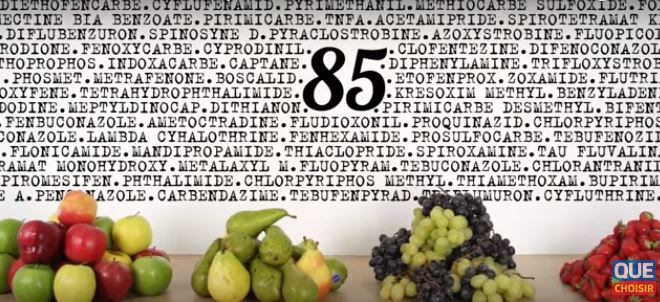Que Choisir sent 150 samples of fruit to an independent laboratory for to be tested for over 500 molecules linked to pesticide use.
It looked at seasonal fruit grown in France as well as produce imported from abroad, buying the apples, pears, grapes and strawberries from a variety of retail outlets, such as major supermarkets, hard discounters

and specialist organic shops.
80% of the fruit contained at least one residue.
All of the fruit samples that were pesticide-free were organic, with one exception.
Lower pesticide exposure is among the top reasons people buy organic foods, and a study conducted last year – thought to be the biggest of its kind – assessed pesticide exposure of 4,400 consumers, finding that people who eat organic foods have about half the pesticide exposure of those who eat conventional produce.
Despite the much greater exposure to pesticide residues on conventionally-produced food, non-organic consumers were still 500 times below established risk levels, said the researchers.
The tests commissioned by Que Choisir found an average between five and seven molecules on the fruit samples. Grapes were the worst offenders, with one sample containing as many as 15 different molecules, followed by strawberries (14), pears (12) and apples with 11.
A total of 85 different chemicals were identified across all the samples which 150 different pieces of fruit, although the tests showed that all conformed with regulation on pesticide limits, apart from one sample of Spanish strawberries which exceeded maximum authorised amounts.
It also found traces of some pesticides that are not authorised in France, or in the producer country (Italy or Spain).
Director of research at France’s national agronomy research centre INRA, told Que Choisir that pesticide use has completely shaped the food sector, from farm to fork.
“For example: there are varieties of potato that are resistant to mildew – a scourge that can require ten to fifteen treatments. But they are not the long, regular-shaped potatoes that industry wants for frying. The result is that they are not cultivated.”
Trigger happy
According to statistics from the French Ministry of Agriculture, the average farmer applies pesticides to crops around 35 times each year.
59,000 tonnes of pesticides were used by French farmers in 2014.
Scare stories?
“Of course, we are talking about small doses,” says Fabienne Maleysson, Que Choisir’s technical editor. “But we are exposed to them all our lives and we don’t really know what the consequences are.
“All the same, the overall conclusion is still in favour of fruit and vegetables. We need to keep eating plenty of them if we are to maintain good health. The solutions are eating organic -if you want to and can afford it - or peeling fruit and vegetables where possible.”
Peeling can reduce by up to half the number of pesticide residues consumed. “Washing fruit, on the other hand, has almost no impact,” Maleysson added.
But a study published recently in the journal Nutrition Today, found that negative information on pesticides and herbicides could be interpreted by consumes as scare stories, with the result that they simply buy less fruit.
The researchers surveyed 510 low-income consumers in the US and found that information messages linking fruit and vegetables with pesticides made people less likely to buy fruit and vegetables in general, whether organic or conventionally produced.
